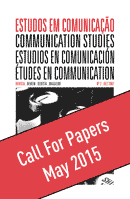Call For Papers Communication Studies #18 (Special Issue)
Special Issue: Advanced Methodologies in Communication Studies
Organizers: Rita Figueiras and Verónica Policarpo – Catholic University of Portugal
«There are times in life when the question of knowing if one can think differently than one thinks, and perceive differently than one sees, is absolutely necessary if one is to go on looking and reflecting at all.»
These lines of Michel Foucault, in his introduction to the second volume of his History of Sexuality, inspire the core concept of this special issue of Communication Studies journal, which is dedicated to explore new methodological insights and advances in communication research. As social phenomena seem to grow in complexity in the media landscape of western societies, social scientists are invited to reinvent their methodological approaches, challenging restrictive views on disciplinary boundaries. In the network society, ‘multimodal communicative networks’ (Castells, 2009: 301) produce and disseminate a plethora of contents in a transmedia fashion, enhancing the convergence culture evidenced by Henry Jenkins in 2006. In the rich and complex media environment of present times, there is no concrete content, nor a central channel; rather there are many diverse sets of media producers and users that have gained an unprecedented role in the definition of contents produced by users and by the media industry. This hyper-media environment led authors such as Roger Silverstone to describe society today as a media-polis, where the city became the place of the media and the media the space of life. Media blend in all aspects of daily life and must not, for that sake, be seen as an external agent that influences people’s lives, but as part of our daily practices that helps us to build meaning, as Mark Deuze suggests. In this context, the growing complexity of the relationship between media, technology, society and individuals demands from Communication, as an established scientific field, an on-going process of reflection and debate. A process that may shed light into what we already know about the issue; the scope of what still remains to be explored in the near future; and the better ways to produce relevant knowledge. Therefore, this special issue aims at contributing to develop our “methodological imagination” in Communication research. The context is a challenging one: like other social sciences, communication has to deal with the increasing complexity of social issues and, consequently, of the disciplinary boundaries that approach them. The challenge lies precisely in facing the fact that innovation may not be achieved simply by crossing disciplines, or by importing well established “ways of doing”, of either distant or close neighbour territories of knowledge. Aiming to discuss the most advanced approaches on research methods and techniques for studying communication subjects, this special issue aspires to be a space of inception of new ideas on how to imagine creative methodologies, as well as how to develop the inheritance of classic ones to the study of emergent and complex social phenomena. In this special issue of Communication Studies we welcome articles that cover this broad thematic and interdisciplinary approach, with an emphasis on:
- New communication theories, new methodological challenges
- Bridging boundaries: new insights into “old methodologies”
- Qualitative materials: rediscovering categorical analysis
- Visual Methodologies
- Social Media Analysis
- Netnographies, web and online ethnographies
- Online data collection (surveys, interviews, ethnography)
- Qualitative in-depth interviews in media research
- Semiotics in a networked landscape
Manuscript submission: Jamuary 15th, 2015
Acceptance notification: February 15th, 2015
Publication: May 2015
Working languages: English, Portuguese, French and Spanish.







